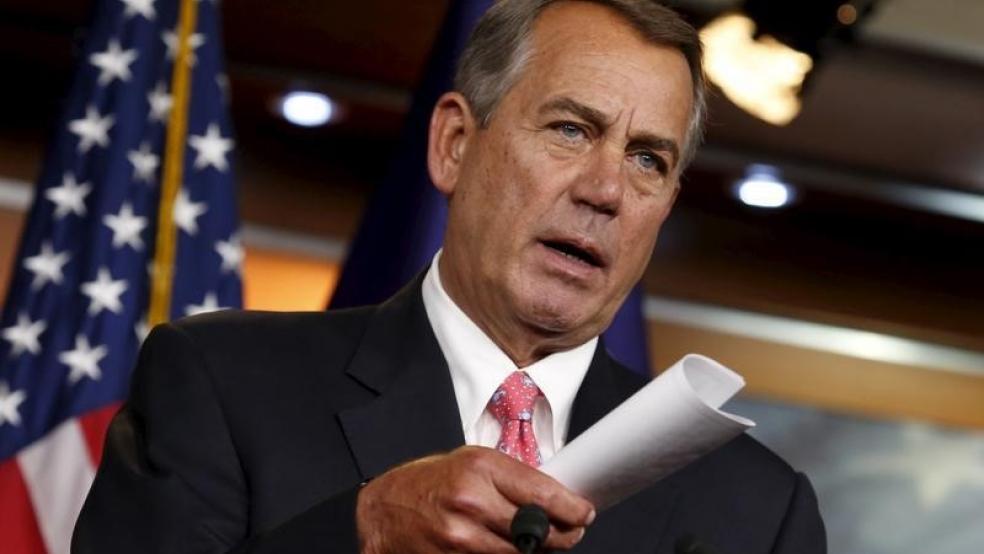With only days left in office, House Speaker John Boehner just might make good on his pledge to “clear up the barn” for his likely successor, Rep. Paul Ryan (R-WI), and spare Ryan a potentially ugly confrontation with arch conservatives before he takes control.
The Ohio Republican, along with other congressional leaders and the White House, are closing in on a two-year fiscal deal that would boost federal spending for defense and domestic programs by $80 billion over the next two years and raise the nation’s debt ceiling just in time to avoid a first-ever default early next week.
Related: Boehner Ready to Exit a Historically Feeble Congress
The details of the bargain are likely to change in the coming days, as Boehner, House Minority Leader Nancy Pelosi (D-CA) and others attempt to craft a new budget blue print that would carry Congress well past the 2016 election. Passage in the House will be contingent on Pelosi galvanizing virtually all of her members while Boehner rounds up several dozen Republicans or more willing to sign onto the agreement that is certain to draw the enmity of the far right.
The tentative deal would blunt would also totally block a threatened 50 percent increase in Medicare Part B premiums beginning in January and a sharp cut in Social Security Disability Insurance benefits – something neither party wants to see happen as the 2016 elections heat up.
Senate Majority Leader Mitch McConnell (R-KY) is hanging back to see what Boehner is capable of achieving on the House side. If the administration and congressional leaders manage to pull it off, the deal would be a huge boon for Ryan, the GOP’s 2012 vice presidential nominee and the current chair of the Ways and Means Committee, who is expected to win House elections late this week to succeed the retiring Boehner.
By working out an agreement to fund the government until 2017, and raising the debt ceiling, Boehner will have removed two tremendous obstacles Ryan would have faced in the first days of his speakership.
Related: As Debt Limit Approaches, Cracks Appear in Nation’s Finances
Both issues have split the GOP rank-and-file in recent years, with hardline fiscal conservatives, especially some in the House, arguing against any attempt to break the budget caps again, as was done in 2013 when Ryan helped to negotiate the last budget deal debt ceiling increase.
Either could have easily tripped Ryan up as he seeks to unify a fractious House GOP conference. His biggest problem may still lie in dealing the forty-some members of the House Freedom Caucus, a group that helped force Boehner into an early retirement.
Outside conservative groups are also unlikely to happy about the budget package, though right now they seem to be focusing their fire on Boehner. “In Washington cleaning the barn is apparently synonymous with shoveling manure on the American people,” Heritage Action chief executive officer Michael A. Needham said in a statement.
Norman Ornstein, a congressional scholar with the American Enterprise Institute, said, “I’ve got to believe that if you move this deal forward to a vote, that [conservative media personalities] Laura Ingraham, Mark Levin, Erick Erickson, Rush Limbaugh and a whole lot of others are going to go ballistic, and they’re going to say Ryan was a part of this. This was a cabal once again with the establishment leadership. But it also means that the most divisive issues through next year are off the table for Ryan, and he can try and focus on some other things.”
Related: Congress Asleep at the Switch as the Debt Ceiling Looms
While the details are still emerging, here’s a look at what’s in the proposed agreement:
- Boost spending by $80 billion – The deal would lift the 2011 Budget Control Act spending caps for another two years to allow a total of $80 billion of fresh spending, evenly divided between defense and domestic programs. It's unclear where the new money would come from. There are reports of offsets ranging from cuts to Medicare and Medicaid benefits to selling fuel from the Strategic Preserve.
- Raise the debt ceiling. The package would raise the current $18.1 trillion limit on government debt and grant the Treasury new authority to continue borrowing to meet the government’s obligations for another year and a half, until March 2017. The debt ceiling doesn’t grant the government increased authority for spending – only authority to borrow to pay the interest and principal on U.S. debt and to keep revenues flowing to federal department and programs to avert a shutdown. Treasury Secretary Jack Lew warned that the Treasury would begin to run out of cash next Tuesday, Nov. 3, unless Congress acted.
- Cap a threatened 50 percent increase in Medicare Part B Premiums. Nearly a third of the 50 million elderly Americans who have Medicare Part D are facing a 50 percent premium increase because of the law that drives up premiums for wealthier Americans and many poor people with chronic medical problems when the Social Security Administration doesn’t approve a cost of living adjustment for Social Security beneficiaries.
- While both parties favored trying to come up with the $10.5 billion needed to block or mitigate the premium increase, Republicans appeared to have prevailed by winning agreement to extend existing measures to contain Medicare and hospital costs, along with spreading the premium increase over a longer period, according to Politico.
- Prevent a cut in Social Security Disability Insurance. With as many as 11 million Americans facing a 19 percent cut in their Social Security Disability Insurance (SSDI) benefits next year, the Republicans were pushing an approach that combines money-saving reforms to the disability insurance program and a substantial “loan” from the much larger old age and survivors’ benefit fund (OASI) – which would eventually have to be repaid.






